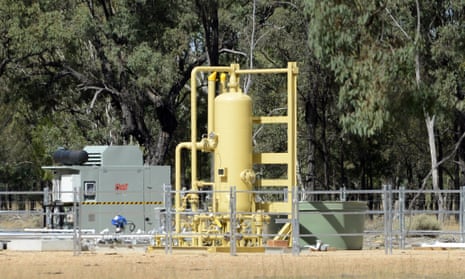An $800m gas pipeline from the Northern Territory to Queensland is one step closer after the federal government granted environmental approval for construction.
The approval, which carries conditions to protect the native death adder snake, had not been expected by the NT government for several weeks, and follows Malcolm Turnbull’s statement that his government will consider “all measures” to ensure energy security.
It puts pressure on the NT Labor government amid an inquiry into its moratorium on fracking.
The pipeline project will stretch from Tennant Creek to Mount Isa in Queensland and may be capable of delivering its first gas next year, but it faces delays over land access disputes with traditional owners.
The federal environmental approval declares the pipeline project can go ahead as long as Jemena, the Chinese-Singaporean government-owned company, does not disturb more than 791 hectares of death adder habitat or remove more than 36 hectares.
Jemena must also conduct open trench inspections, and within five years of completing construction rehabilitate no less than 791 hectares. It must also gain approval for a rehabilitation plan before it can start construction, and publish regular compliance reports.
The pipeline, should it go ahead, is expected to initially transport surplus gas from the Blacktip pipeline which brings supplies from the Timor Sea, and potentially from an onshore industry if the NT government lifted its fracking moratorium.
It will link NT gas fields to the east coast, where domestic gas reserves are at the centre of a growing energy supply crisis.
On Friday Malcolm Turnbull refused to rule out reserving gas for the domestic industry, as export levels pushed Australian gas prices to international levels and restricted supply to domestic users. Turnbull said the gas suppliers were “on notice” and everything was on the table, despite his resources minister having spoken against gas reservation.
At a fracking inquiry in Darwin on Friday, a representative for Santos, which has interests in the NT, reportedly said any fracked gas would be sold domestically as well as exported.
Having already received environmental approval from the Queensland government, Jemena was now waiting on the Northern Territory.
The NT primary industries and resources minister, Ken Vowles, said last week he expected the approval to take “a couple of weeks” and NT government approvals would not be granted until federal approval came through.
“This is the environmental piece of the puzzle, and the other is the resequencing approval, mainly relating to land access,” a Jemena spokesman told Guardian Australia.
Last week Jemena announced it was delaying the start of construction because of the land access dispute.
The Northern and Central Land Councils have held consultation meetings and claim to have agreement from the required traditional owners as well as their lawyers, but traditional owners from the Warumungu and Wakaya land trusts have protested against the approval.
Those opposed claim they were not consulted, had not given approval and did not want any gas from fracked land going through their country. An emergency objection to land clearing for the pipeline was lodged in February.
Guardian Australia understands the NLC and CLC will meet traditional owners next week to explain the delay and the consequences of not signing an agreement.
Gadrian Hoosan, a traditional owner from country near Borroloola, said fracking threatened the land and water of remote communities, as well as their livelihoods and culture.
“We will not allow our traditional country to be a sacrifice zone for fracking, while the gas industry profits at our expense,” he said.
Naomi Hogan, Northern Territory coordinator for the Lock the Gate Alliance, said the pipeline threatened the NT government’s fracking moratorium. NT shale gas was “the most expensive way to produce gas in all of Australia” and the Jemena pipeline charged the most per kilometre for transporting it, she said.
“The federal government is desperate to promote the gas industry, while ignoring the high costs and long delays in bringing fracked gas to market,” she said. “The NT gas pipeline will do nothing to solve the issues being faced by South Australia.”
The federal environment minister and NT resources minister have been contacted for comment.

Comments (…)
Sign in or create your Guardian account to join the discussion